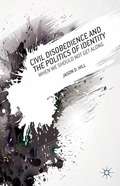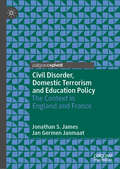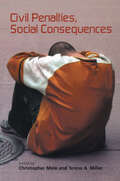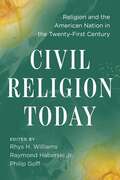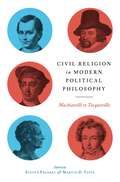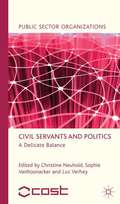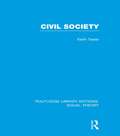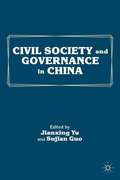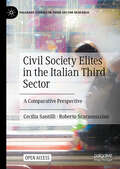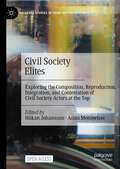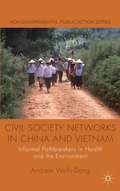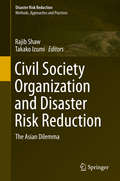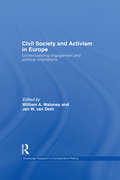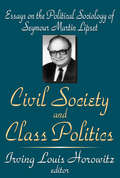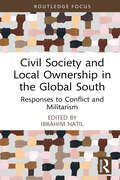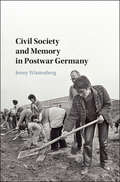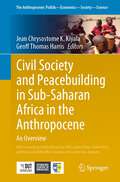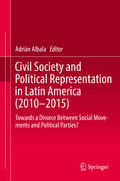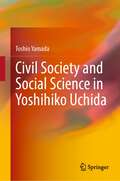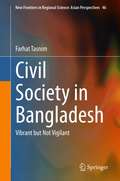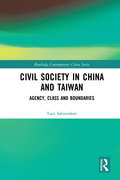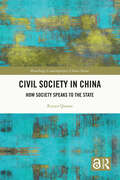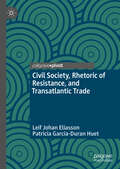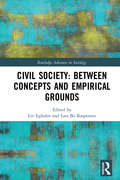- Table View
- List View
Civil Disobedience and the Politics of Identity
by Jason D. HillCivil Disobedience and the Politics of Identity is an attempt to provide criteria for when it is both morally necessary and politically expedient to break with civic harmony social cohesion in the name of a higher social justice.
Civil Disorder, Domestic Terrorism and Education Policy: The Context in England and France
by Jan Germen Janmaat Jonathan S. JamesThis book explores the links between education policy and occurrences of civil disorder and domestic terrorism in England and France. Since 2001, both England and France have experienced outbreaks of rioting in which young people of immigrant origin have been implicated: both have also been the targets of domestic terror attacks perpetrated by their own citizens. Both countries have had similar experiences of immigration since the end of the Second World War, but they are considered to have taken divergent approaches to immigrant integration and education. While Britain has tended towards a multicultural race relations approach, France veers towards a Republican assimilationist approach. Through the analysis of policy discourse and documents, the authors seek to establish whether these distinct approaches to immigrant integration and education policy have been maintained or whether they are converging. This book will appeal to students and scholars of education policy as well as immigration and integration in both France and England.
Civil Penalties, Social Consequences
by Teresa A. Miller Christopher MeleMele and Miller offer a timely, insightful analysis of the continuing challenges faced by ex-felons upon re-entry into society. Such penalties include a lifetime ban on receiving welfare and food stamps for individuals convicted of drug felonies as well as barriers to employment, child rearing, and housing opportunities. This much-needed work contains pieces by scholars in law, criminology, and sociology, including: Scott Christianson, Michael Lichter, and Daniel Kanstroom.
Civil Religion Today: Religion and the American Nation in the Twenty-First Century
by Philip Goff Rhys H. Williams Raymond Haberski Jr.Moves the discussion of American civil religion into the twenty-first century Civil Religion, a term made popular by sociologist Robert Bellah a little over fifty years ago, describes how people might share in a sacred sense of their nation. While hotly debated, the idea continues to enjoy wide application among academics and journalists. Bellah used civil religion to make sense of the turmoil of the 1960s, especially moral debates provoked by the Vietnam War. Now, a half-century later, American society is again riven by conflict over immigration, economic inequality, racial oppression, and “culture wars” issues. Is Bellah's hopeful assessment still useful for understanding contemporary America? If not, how should we think of it differently?Civil Religion Today reassesses the term to take stock of its usefulness after fifty years of engagement in the field. Looking both at the concept and at ground-level studies of how we might find civil religion in practice, this book aims to push the conversation forward, considering how and in what ways it is helpful in our current social and political context, evaluating which parts are worth keeping, which can be reformulated, and which can now be usefully discarded. It suggests we go “beyond Bellah” in theory and practice, thinking about American society in a new century.
Civil Religion in Modern Political Philosophy: Machiavelli to Tocqueville
by Martin D. Yaffe Steven FrankelInspired by Machiavelli, modern philosophers held that the tension between the goals of biblical piety and the goals of political life needed to be resolved in favor of the political, and they attempted to recast and delimit traditional Christian teaching to serve and stabilize political life accordingly. This volume examines the arguments of those thinkers who worked to remake Christianity into a civil religion in the early modern and modern periods.Beginning with Machiavelli and continuing through to Alexis de Tocqueville, the essays in this collection explain in detail the ways in which these philosophers used religious and secular writing to build a civil religion in the West. Early chapters examine topics such as Machiavelli’s comparisons of Christianity with Roman religion, Francis Bacon’s cherry-picking of Christian doctrines in the service of scientific innovation, and Spinoza’s attempt to replace long-held superstitions with newer, "progressive" ones. Other essays probe the scripture-based, anti-Christian argument that religion must be subordinate to politics espoused by Jean-Jacques Rousseau and David Hume, both of whom championed reason over divine authority. Crucially, the book also includes a study of civil religion in America, with chapters on John Locke, Montesquieu, and the American Founders illuminating the relationships among religious and civil history, acts, and authority. The last chapter is an examination of Tocqueville’s account of civil religion and the American regimeDetailed, thought-provoking, and based on the careful study of original texts, this survey of religion and politics in the West will appeal to scholars in the history of political philosophy, political theory, and American political thought.
Civil Religion in Modern Political Philosophy: Machiavelli to Tocqueville
by Martin D. Yaffe Steven FrankelInspired by Machiavelli, modern philosophers held that the tension between the goals of biblical piety and the goals of political life needed to be resolved in favor of the political, and they attempted to recast and delimit traditional Christian teaching to serve and stabilize political life accordingly. This volume examines the arguments of those thinkers who worked to remake Christianity into a civil religion in the early modern and modern periods.Beginning with Machiavelli and continuing through to Alexis de Tocqueville, the essays in this collection explain in detail the ways in which these philosophers used religious and secular writing to build a civil religion in the West. Early chapters examine topics such as Machiavelli’s comparisons of Christianity with Roman religion, Francis Bacon’s cherry-picking of Christian doctrines in the service of scientific innovation, and Spinoza’s attempt to replace long-held superstitions with newer, “progressive” ones. Other essays probe the scripture-based, anti-Christian argument that religion must be subordinate to politics espoused by Jean-Jacques Rousseau and David Hume, both of whom championed reason over divine authority. Crucially, the book also includes a study of civil religion in America, with chapters on John Locke, Montesquieu, and the American Founders illuminating the relationships among religious and civil history, acts, and authority. The last chapter is an examination of Tocqueville’s account of civil religion and the American regime.Detailed, thought-provoking, and based on the careful study of original texts, this survey of religion and politics in the West will appeal to scholars in the history of political philosophy, political theory, and American political thought.
Civil Servants and Politics
by Sophie Vanhoonacker Christine Neuhold Luc VerheyThis comparative study focuses on the changing relations between civil servants and politicians in the European Union in the last two decades. As well as national case studies this book also looks into politico-administrative relations in supranational institutions such as the European Commission and the European Parliament.
Civil Society (Routledge Library Editions: Social Theory)
by Keith TesterThis major study discusses some of the meanings and preconditions of freedom, responsibility and social order. The author argues that these are problems of modernity. The imagination of civil society created a milieu which was at once the location and defence of social self-sufficiency in the world. The book identifies the origins of civil society in the work of Locke, Hobbes, Rousseau and the often forgotten philosophers of the Scottish Enlightnement. It shows how the assumptions of civil society, and the state of nature, fed into the sociological and philosophical discourses which emerged in the nineteenth century. The book does not ask ‘What is civil society?’; instead it asks ‘Why is civil society?’ The author concludes that through civil society, the protagonists and heirs of European modernity struggled to make their world meaningful and safe. Civil society involved the establishment of boundaries between the community of the social and the terrifying milieu of Nature.
Civil Society And Governance In China
by Sujian Guo Jianxing YuWritten by scholars from both inside and outside China, this wide-ranging collection of essays explores the complexity of the relationship between governance and civil society by combining theoretical exploration and empirical case studies based on the governance practice in China.
Civil Society Elites in the Italian Third Sector: A Comparative Perspective (Palgrave Studies in Third Sector Research)
by Roberto Scaramuzzino Cecilia SantilliThis open access book unveils the hidden elite of Italy's third sector, offering a rare glimpse into the lives and minds of civil society's most influential leaders. Bridging elite and civil society studies, it presents pioneering research on these powerful yet understudied figures. Through in-depth analysis, the chapters reveal surprising insights about the elite's composition, attitudes, career trajectories, and views on power. Essential reading for scholars of democracy, civil society, and social policy, this volume challenges conventional wisdom about leadership in the nonprofit world. By illuminating the dynamics of Italy's third sector elite, it reshapes our understanding of civil society's role in modern democracies.
Civil Society Elites: Exploring the Composition, Reproduction, Integration, and Contestation of Civil Society Actors at the Top (Palgrave Studies in Third Sector Research)
by Håkan Johansson Anna MeeuwisseThis open access book introduces a groundbreaking concept - civil society elites - and serves as an essential resource for scholars, researchers and students interested in the complexities of power and influence within contemporary civil societies. Through a series of unique empirical studies, the authors offer a comprehensive examination of the individuals occupying the upper echelons of influential civil society organisations and movements. By delving into the factors that propel individuals into key positions and examining the connections between civil society leaders within and across sectors, the book offers insight into the mechanisms that shape access to powerful positions in civil societies. As a reflection of current debates on elites and populism, the book furthermore explores the expression and conceptualisation of counter-elite positions and criticism of civil society elites. With its original approach, the book serves as a catalyst for further research into inequalities, power structures and elites within civil societies.
Civil Society Networks in China and Vietnam
by Andrew Wells-DangThis book brings a fresh, original approach to understand social action in China and Vietnam through the conceptual lens of informal environmental and health networks. It shows how citizens in non-democratic states actively create informal pathways for advocacy and the development of functioning civil societies.
Civil Society Organization and Disaster Risk Reduction: The Asian Dilemma (Disaster Risk Reduction)
by Rajib Shaw Takako IzumiCivil society organizations (CSOs) have played important roles over the years in the disaster field Starting from the traditional approach of response and relief, the emphasis has gradually shifted to disaster risk reduction From international nongovernmental organizations (NGOs) to national and local NGOs, all stakeholders have recognized the significance of and need for community-based risk reduction. In their different capacities they have endeavored to establish links to the policy options at the local and national levels There still are many issues that remain untouched by CSOs, however, and local CSOs face special challenges in resources in terms of human, financial, and technical issues Drawing examples from Asia, this book is structured on the roles of CSOs according to the Hyogo Framework for Action priority areas: policy making, risk assessment, education and training, underlying risk factors, and response-recovery The primary target groups for this book are students and researchers in the fields of environment, disaster risk reduction, and climate change studies The book provides a clear view of the current trends of research in the field and furnishes basic knowledge on these important topics Another target group comprises practitioners and policy makers, who will be able to apply the knowledge collected here to policy and decision making.
Civil Society and Activism in Europe: Contextualizing engagement and political orientations (Routledge Research in Comparative Politics)
by Jan W. Van Deth William A. MaloneyThis book examines the role of civil society organizations in several advanced European democracies: Germany, the Netherlands, Spain, Switzerland and the United Kingdom. Specifically the book focuses on how voluntary organizations contribute to civic and democratic health and assesses the impact of different organizational types on social capital. Building on Citizenship and Involvement in European Democracies and Social Capital and Associations in Europe (2007), this volume seeks to widen and deepen the analysis by introducing new data on activists and combining it with the organizational data and the population data. It evaluates the impact of the organizational context on individual activity profiles and attitudes and values of activists and provides a unique assessment on the contribution that voluntary associations make to civil and democratic society. Part One deals with the consequences of associational involvement for several attitudinal and behavioural orientations and Part Two expands the scope of the effects of voluntary associations towards European attitudes. This book is essential reading for students and scholars of civil society, democracy, political participation, politics and sociology.
Civil Society and Class Politics: Essays on the Political Sociology of Seymour Martin Lipset
by Irving Louis HorowitzSeymour Martin Lipset's work throughout a long and distinguished career has been stamped by several features: a powerful linkage of research data and social theory, innovative views of historical events, and a realization that politics is an activity native to all human beings, voters and non-voters, democratic and non-democratic systems, and advanced and developing economies. He has earned the right to be called a genuine pioneer in the field now recognized as political sociology. In this special collection of professional comment and personal tribute, some of Lipset's closest colleagues have gathered to review his life work in political sociology. This volume includes essays on sociology and socialism, the collapse of class politics, political leadership, the perpetuation of inequality across generations, political extremism, religion as a source of polarization, working-class authoritarianism, and an examination of civil life in the United States across the century. Among the contributors are Nathan Glazer, Terry Nichols Clark, Richard J. Samuels, Sidney Verba, Nancy Burns, Kay Lehman Schlozman, Robert B. Smith, William Schneider, Dick Houtman, and Marcella Ridlen Ray. The volume is further graced by two special features: an academic memoir entitled "Steady Work" written by Lipset, and a full-scale bibliography of his books, monographs and pamphlets. In short, this is a specialist volume for social scientists that can be easily enjoyed by readers outside the field. This volume was initially presented as a double issue of The American Sociologist. Horowitz was commissioned by the editor of the journal to serve as special editor for the volume. In turn, the contributions originated at a series of invited panels at the Eastern Sociological Society meetings in 2002.
Civil Society and Local Ownership in the Global South: Responses to Conflict and Militarism (Routledge Explorations in Development Studies)
by Ibrahim NatilThis book assesses local civil society responses to conflict, militarism, climate change, and disease in the global south.Grounded in empirical analyses of civil society developments in Sub-Saharan African countries, Jordan, Lebanon, Yemen, Palestine, and Syria, the book demonstrates that civil society organisations in unstable circumstances and divided societies have room and power to help and influence their societies and to become engaged in supporting active participation in society to help communities to endure uncertainty. The book considers the ways in which crises of conflict, war, climate change, and disease have challenged civil society organisations in their scope of work and operations. It also demonstrates the benefits of local ownership and grassroots initiatives in helping to empower local people by contributing to decision-making processes in peacebuilding and post-conflict consensus-building.This book will be an important read for researchers looking for a new approach to civil society in a global south context, by focusing on local ownership and the different perspectives for each country, in terms of leadership culture and development in practice.
Civil Society and Memory in Postwar Germany
by Jenny WüstenbergBlending history and social science, this book tracks the role of social movements in shaping German public memory and values since 1945. Drawn from extensive original research, it offers a fresh perspective on the evolution of German democracy through civic confrontation with the violence of its past. Told through the stories of memory activists, the study upends some of the conventional wisdom about modern German political history. An analysis of the decades-long struggle over memory and democracy shows how grassroots actors challenged and then took over public institutions of memorialization. In the process, confrontation of the Holocaust has been pushed to the centre of political culture. In unified Germany, memory politics have shifted again, as activists from East Germany have brought attention to the crimes of the East German state. This book delivers a novel and important contribution to scholarship about postwar Germany and the wider study of memory politics. An innovative and accessible perspective on the history of German postwar memory politics, that will appeal to specialists and readers who are new to the subject. A thorough analysis of the interactions between civil society and state in memory politics is combined with compelling stories of memory activism. Presents new arguments and concepts about the interpretation of memory, which will appeal to those interested in the wider study of memory politics.
Civil Society and Peacebuilding in Sub-Saharan Africa in the Anthropocene: An Overview (The Anthropocene: Politik—Economics—Society—Science #34)
by Jean Chrysostome K. Kiyala Geoff Thomas HarrisThis book examines civil society's peacebuilding role in sub-Saharan Africa in the contextof climate change and the pursuit of environmental peace and justice in the Anthropocene.Five main research themes emerge from its 20 chapters:· The roles of environmental peacemaking, environmental justice, ecologicaleducation and eco-ethics in helping to mitigate the impacts of climate change· Peacebuilding by CSOs after violent conflicts, with particular reference toaccountability, reconciliation and healing· CSO involvement in democratic processes and political transition after violentconflicts· Relationships between local CSOs and their foreign funders and the interactionsbetween CSOs and the African Union's peace and security architecture.· The particular role of faith-based CSOsThe book underlines the centrality of dialogue to African peacebuilding and the indigenouswisdom and philosophies on which it is based. Such wisdom will be a key resource inconfronting the existential challenges of the Anthropocene.The book will be a significant resource for researchers, academics and policymakersconcerned with the challenge of climate change, its interactions with armed conflict and thepeacebuilding role of CSOs.· This pathbreaking book shows why peacebuilding analysis and efforts need to beurgently re-oriented towards the existential challenges of environmental peace andjustice.· It explains the emerging conceptual frameworks which are needed for this new role.· It explains the critical role that CSOs - local and international - will play inimplementing this new peacebuilding approach, with particular reference to sub-Saharan Africa.
Civil Society and Political Representation in Latin America (2010-2015): Towards a Divorce Between Social Movements and Political Parties?
by Adrián AlbalaThis book presents in-depth analyses of the wave of political protest and unrest that spread throughout Latin America between 2010 and 2015 in order to answer a question that has been challenging social scientists all over the region: why some countries have faced a divorce between their social movements and political parties while others have not? The contributions gathered in this volume intend to show that the logic of political representation in Latin America and its supposed “crisis” is not a common and constant feature for all region. Some countries like Chile, Brazil, Colombia and Mexico seem to have experienced a process of autonomization of its social movements vis-à-vis its institutional political system. However, Argentina, Bolivia, Ecuador and Uruguay have not seen such a split between civil society and the political parties.Bringing together eight case studies of the countries mentioned and a general assessment of the situation in the whole region, this book presents some interesting findings that will contribute to the discussions about the political representation crisis in Latin America, providing valuable resources for political leaders, researchers, policy makers and social activists in the region.
Civil Society and Social Science in Yoshihiko Uchida
by Toshio YamadaThis book introduces the work of Yoshihiko Uchida (1913–1989), one of the most prominent Japanese thinkers on the topic of civil society in the post-World War II era. The distinctive features of Uchida’s approach to civil society are his view of the metabolic relationship between human beings and nature and his call for a social science rooted in the experiences and inquiries of ordinary citizens. This original approach did not develop in a straight line from Uchida’s early work to his mature period, and this book follows the twists and turns in its formation through his reflections on the relationships between “the civil” and “the capitalistic,” “the modern” and “the pre-modern,” “the historical” and “the trans-historical,” and “science by specialists” and “inquiry by laypeople.” As a historian of economic thought, Uchida pursued these topical themes by examining figures such as Adam Smith, Karl Marx, and Hajime Kawakami, a prominent thinker in Japan. By casting a light on these inquiries, this book offers the first depiction of Uchida’s body of work as a whole and in doing so illuminates the emergence of original democratic thought in post-war Japan.
Civil Society in Bangladesh: Vibrant but Not Vigilant (New Frontiers in Regional Science: Asian Perspectives #46)
by Farhat TasnimThis book is the first of its kind to offer an understanding, analysis, and prediction of the state of civil society in Bangladesh in relation to development and democracy. It is a research attempt to reveal the paradox found in developing countries like Bangladesh where there are numerous and active civil society organizations (CSOs) that have had almost no influence in consolidating democracy. This book, however, also qualifies the normative assumption on the positive relationship between civil society and democracy asserted by the mainstream neo-Tocquevillean School that has a profound influence on donor policies. Readers are introduced to civil society in Bangladesh from a broad perspective. Rather than confining the analysis to NGOs, chapters explore the origin, nature, and function of both modern and conventional CSOs, which helps to provide a more authentic understanding of the genuine state of civil society in relation to other actors in the political system. Combining survey data analyses and empirical observations with carefully chosen case studies, the book reveals that CSOs participate very actively in social services. This research also reveals that these highly active CSOs in the field of social development lack the necessary attributes for ensuring participation, proper interest articulation and monitoring of the state. Through systematic analysis, the book shows that political structures—and for Bangladesh, particularly political parties—along with vertical social relationships such as clientelism, patronage, nepotism, and corruption have contributed to a non-vigilant civil society in Bangladesh, although it often is spoken of in different terms. This book is highly recommended for researchers, students, and development practitioners interested in South Asia as well as in understanding the potentials and limitations of civil society in relation to development and democracy.Farhat Tasnim's book is a comprehensive treatment of civil society in Bangladesh. It will serve as a useful resource for future researchers in this field for a long time to come. Harry Blair, Yale University, USA Farhat Tasnim provides in this book a new perspective on one of the essential cases of civil society study, Bangladesh. Her penetrating analysis of the relationship of civil society organizations and democracy in Bangladesh should attract a wide readership. This is an important book not only for students of Bangladesh, but for scholars and practitioners interested in the relationship of civil society organizations and democracy. Robert J. Pekkanen, University of Washington, USA
Civil Society in China and Taiwan: Agency, Class and Boundaries (Routledge Contemporary China Series)
by Taru SalmenkariThe concept of 'civil society' has often been used as a devise for differentiating China from other cultures. Though sometimes portrayed as a growing phenomenon, Chinese civil society is frequently said to be non-existent. Definitional deficiencies have, therefore, led to both a simplification and a narrow appreciation of societal developments in China. By examining various forms of activity, such as NGOs, residential movements, and alternative spaces, this book, however, reassesses the idea of Chinese civil society. Through questioning current methodological, theoretical and structural assumptions, it uses an empirical approach to criticize and expand upon existing understandings of civil society as it is applied in the field of Chinese Studies. Based upon ethnographic research undertaken among activists in both mainland China and Taiwan, it examines issues such as inequality, the mobilizing skills needed for civil society activities, and the technologies which exist to maintain the boundary between state and society. Offering an analysis of Chinese civil society in the context of modernization, social and economic liberalization, and international civil society promotion, this book will be useful to students and scholars of Chinese Studies and Taiwan Studies, as well as development studies and civil society studies.
Civil Society in China: How Society Speaks to the State (Routledge Contemporary China Series)
by Runya QiaoanChinese civil society groups have achieved iconic policy advocacy successes in the areas of environmental protection, women’s rights, poverty alleviation, and public health. This book examines why some groups are successful in policy advocacy within the authoritarian context, while others fail. A mechanism of cultural resonance is introduced as an innovative theoretical framework to systematically compare interactions between Chinese civil society and the government in different movements. It is argued that civil society advocacy results depend largely on whether advocators can achieve cultural resonance with policymakers and the mainstream public through their social performances. The effective performance is the one in which advocators employ symbols embraced by the audience (policymakers and the public) in their actions and framings. While many studies have tried to explain the phenomena of successful policy advocacy in China through institutional or organizational factors, this book not only contains extensive empirical data based on field research, but takes a cultural sociological turn to identify the meaning-making process behind advocacy actions. Civil Society in China will appeal to students and scholars of sociology, political science, social work, and Chinese and Asian studies more broadly.
Civil Society, Rhetoric of Resistance, and Transatlantic Trade
by Leif Johan Eliasson Patricia Garcia-Duran HuetThis book investigates the politics of transatlantic trade, specifically the Transatlantic Trade and Investment Partnership negotiations. Using a novel approach, the authors analyze the rhetorical choices made by opponents and supporters of an agreement, and the logical behind their arguments. Opponents used emotive frames and strategically chosen issues to increase public opposition to the negotiations; supporters countered, but also accommodated, parts of opponents’ rhetoric in hopes of quelling discontent. The study also highlights the resulting changes to EU trade policy, thus contributing to the literatures on trade policy, politicization, and rhetorical analysis.
Civil Society: Between Concepts and Empirical Grounds (Routledge Advances in Sociology)
by Liv Egholm and Lars Bo KaspersenExamining the historical and social trajectories involved in the continuous development of civil society, this volume reveals the contextual nature of the process. Through empirical studies focusing primarily on Denmark and covering the period from 1849 to the present day, it analyses the manner in which civil society has been practised and transformed over time. Presenting a new theoretical framework informed by a relational and processual perspective, the book sheds new light on familiar questions pertaining to civil society, the production of its boundaries and spaces of action, and the means by which these spaces can become causal factors. A fresh intervention in the study of a concept that has been central in defining ideas of solidarity and the common good, and to which researchers and politicians look for solutions to the great challenges of our time, Civil Society: Between Concepts and Empirical Grounds will appeal to scholars of sociology, politics, history and philosophy with interests in civil society.
